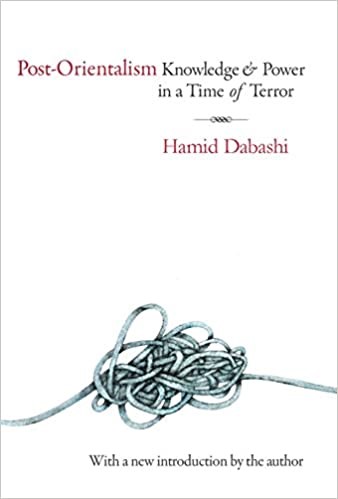The Paperback Edition with a New Preface
Routledge (2015)
Post-Orientalism is a sustained record of Hamid Dabashi’s reflections over many years on the question of authority and power. Who gets to represent whom and by what authority? Dabashi’s work picks up where Edward Said’s Orientalism left off. Said traced the origin of the power of representation and the normative agency that it entails to the colonial hubris that carried a militant band of mercenary merchants, military officers, Christian missionaries, and European Orientalists around the globe. This hubris enabled them to write and represent the people they sought to rule.
Dabashi’s book is not as much a critique of colonial representation as it is of the manners and modes of fighting back and resisting it. He does not question the significance of Orientalism and its principal concern with the colonial acts of representation, but he provides a different angle that argues for the primacy of the question of postcolonial agency.
Dabashi uses the United States as an example of a country that initiated militant acts of representation in Iraq and Afghanistan. He attempts to unearth and examine the United States’ deeply rooted claim to normative and moral agency, particularly in light of the world’s post-9/11 political reality.
Reviews:
“Dabashi has written an interesting book that sociologists of culture would find useful. . . . Dabashi’s volume is a solid guide . . . and since the United States and Europe are clearly going to be studying and interacting with Muslim cultures for the foreseeable future, a book like his provides encouraging illumination.” —Contemporary Sociology
“Hamid Dabashi belongs to a marvelous tradition of poetic thinkers, whose deep insights are crafted in magnificent poetic prose, thus providing his readers with the wine of literary pleasure along with rich food for thought.” —Gilbert Achcar, University of London
“In this fascinating and prodigious work, Hamid Dabashi offers a compelling analysis of the various phases and modes of Orientalism and persuasively demonstrates the mutations in the evolving modes of knowledge production about Islam and the Middle East. . . . It is a conceptually and intellectually elegant, subtle and politically trenchant book and as such, it will interest everyone concerned with the contemporary processes of global politics in a wide range of fields.” —Meyda Yegenoglu, Middle East Technical University
“Dabashi is learned, poetic, ranging from philosophy to film, every word written with a commitment to the possibility of a just world.” —Gayatri Chakravorty Spivak, Columbia University



 Columbia University
Columbia University Aljazeera
Aljazeera Middle East Eye
Middle East Eye Springer Palgrave
Springer Palgrave